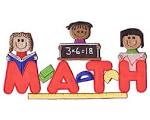All About 4th Grade
By the end of 4th Grade students will be able to:
· Apply mathematics to problems arising to everyday life, society, and the workplace
· Use a problem solving model that includes formulating a plan, analyzing information, determining a solution and justifying its reasonableness.
· Communicate mathematical ideas
· Analyze mathematical relationships
· Display, explain and justify mathematical ideas using mathematical language
· Represent the value of a whole number to 1,000,000,000 and decimals through the hundredths using expanded notation and numerals
· Relate decimals to fractions
· Compare, add and subtract fractions
· Add and subtract whole numbers and decimals
· Solve one and two step word problems involving multiplication and division
· Represent problems using an input-output table
· Solve problems involving perimeter and area
· Classify two dimensional figures
· Determine the measurements of angles using a protractor
· Solve problems involving measurement of length, intervals of time, liquid volume, mass and money
· Sequence and summarize the plot’s main events
· Summarize the main idea of text
· Describe relationships amongst texts organized by cause and effect, sequence or comparison
· Use text features to gain an overview of the contents of a text
· Understand, make inferences, and draw conclusions about the structure and elements of fiction and expository text and provide evidence to support their answer.
· Make connections between literary and informational texts and provide evidence.
· Determine the meaning of words derived from Greek or Latin affixes
· Use the context of a sentence to determine the meaning of unfamiliar words
· Use a glossary or dictionary
· write a composition that establishes a central idea and topic sentence, includes supporting details and a concluding statement
· develop, revise and edit drafts
· use complete subjects and complete predicates
· use and understand verbs, adjectives, nouns, adverbs, prepositional phrases, reflexive pronouns, correlative conjunctions, time order transition words
· use scientific inquiry methods during laboratory and outdoor investigations
· use critical thinking and scientific problem solving to make informed decisions
· know how to use a variety of tools, materials, equipment, and models to conduct science inquiry
· knows that matter has measurable physical properties and those properties determine how matter is classified, changed, and used
· know that energy exists in many forms and can be observed in cycles, patterns, and systems
· know that Earth consists of useful resources and its surface is constantly changing
· know that there are recognizable patterns in the natural world and among the Sun, Earth, and Moon system
· know and understands that living organisms within an ecosystem interact with one another and with their environment
· know that organisms undergo similar life processes and have structures that help them survive within their environment
· understand the origins, similarities, and differences of American Indian groups in Texas and North America before European exploration
· understand the causes and effects of European exploration and colonization of Texas and North America
· understand the importance of the Texas Revolution, the Republic of Texas, and the annexation of Texas to the United States
· understand important issues, events, and individuals of the 20th century in Texas
· use geographic tools to collect, analyze, and interpret data
· understand the concept of regions
· understand the location and patterns of settlement and the geographic factors that influence where people live
· understand how people adapt to and modify their environment
· understand the basic economic activities of early societies in Texas and North America
· understand the characteristics and benefits of the free enterprise system in Texas
· understand patterns of work and economic activities in Texas
· understand how Texas, the United States, and other parts of the world are economically interdependent
· understand how people organized governments in different ways during the early development of Texas
· understand important ideas in historical documents of Texas and the United States
· understand important customs, symbols, and celebrations of Texas
· understand the importance of active individual participation in the democratic process
· understand the importance of effective leadership in a constitutional republic
· understand the contributions of people of various racial, ethnic, and religious groups to Texas
· understand the impact of science and technology on life in Texas
· apply critical-thinking skills to organize and use information acquired from a variety of valid sources, including electronic technology
|
|



